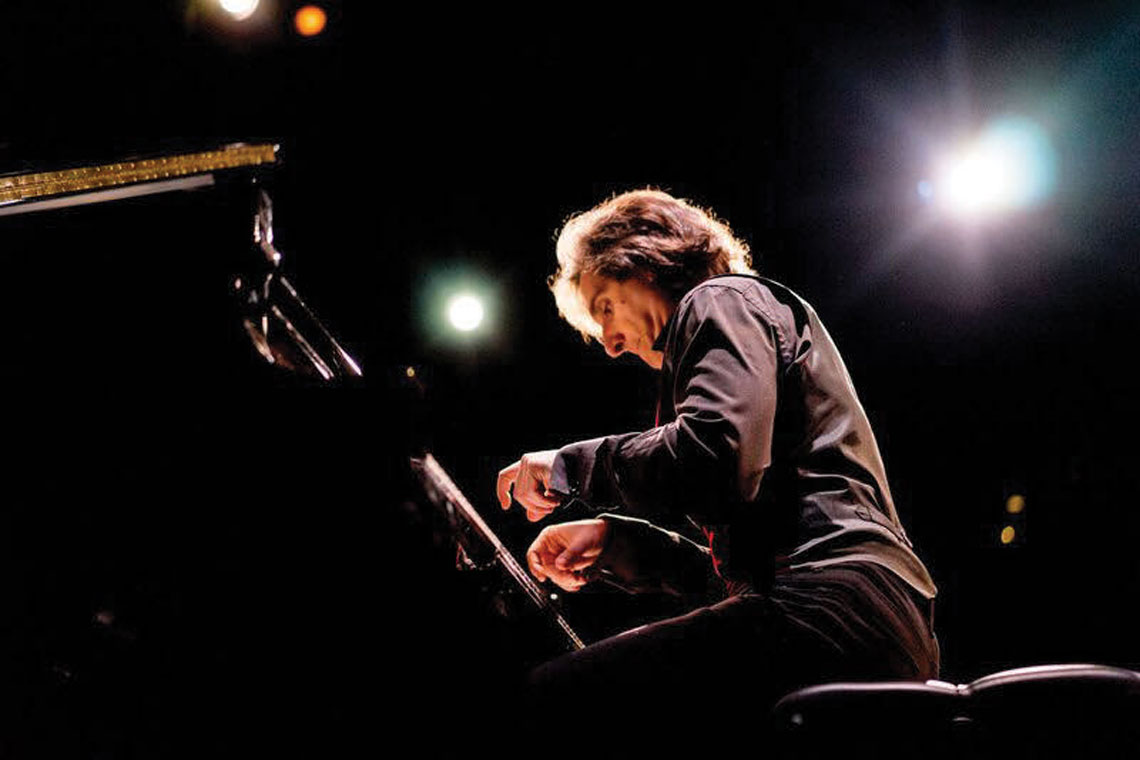 Hershey Felder performs in “Our Great Tchaikovsky.” Photo courtesy of Hershey Felder Presents
Hershey Felder performs in “Our Great Tchaikovsky.” Photo courtesy of Hershey Felder Presents Hershey Felder, who has brought to life onstage the world’s great classical and popular composers — from Beethoven and Chopin to George Gershwin and Irving Berlin — is bringing to Los Angeles the soaring music and tormented life of Pyotr (Peter) Ilyich Tchaikovsky.
Felder’s talents and skills as a pianist, actor, playwright, composer and producer will dominate the Wallis Annenberg Center for Performing Arts stage in Beverly Hills from July 19 to Aug. 6 in the concert-play “Our Great Tchaikovsky.”
The production will be a homecoming of sorts for the Canadian-born Felder, 49, who started his series of interpreting great composers some 22 years ago in L.A.
Audiences will get a generous sampling of the Russian master’s works, from such favorites as the “1812 Overture,” “Marche Slave,” selections from “The Nutcracker” and “Swan Lake,” as well as the little-known “Jurisprudence March.” Also on the program are parts of the Fourth, Fifth and Sixth symphonies, “Romeo and Juliet,” “Eugene Onegin,” and the first movements of the Piano and Violin concertos.
But beyond the music in his one-man show, Felder explained in a phone interview, he aims to create, or re-create, the character of his protagonist and, in this case, illustrate the process of “becoming Tchaikovsky.”
Before embarking on this complex creation, Felder and his associates spent 18 months researching the many aspects of the composer’s life (1840-1893) as well as the political atmosphere in Russia during the reign of the czars and today.
A persistent torment of Tchaikovsky’s life and work was his fear of being outed as a homosexual in a harshly intolerant time and society, which became “an ongoing theme in his life and work” much as a hidden Jew in Nazi Germany might constantly fear exposure, Felder said.
Tchaikovsky’s relationship with Jews and anti-Semitism was complex. In one letter, for example, he described a group of men gathered at a railroad station as “a mass of dirty Yids, with that poisoning of the atmosphere which accompany them everywhere.” And yet, in contrast to such remarks, Tchaikovsky provided a scholarship for a young Jewish violinist, maintained a deep friendship with composer-conductors Anton and Nikolai Rubinstein, and defended Felix Mendelssohn against Richard Wagner’s anti-Semitic slurs.
Felder, who was raised in a Yiddish-speaking home mainly by his widowed father, a Holocaust survivor, has considered the matter of alleged anti-Semitism by some great artists at considerable length and depth.
“This is a very complicated matter,” he said repeatedly, explaining that “Tchaikovsky was a man of his time,” when the intelligentsia of Russia and other European countries was anti-Semitic almost by reflex.
As an analogy, Felder noted that in the following century George Gershwin, living in New York and Los Angeles, commonly referred to his path-breaking work “Porgy and Bess” as his “n—– opera.”
“Did that make Gershwin anti-Black?” Felder asked. “We can’t correct or apologize for history, and I don’t feel that I have to go into this aspect [of Tchaikovsky’s life] in my stage presentation.”
In 1891, Tchaikovsky crossed the United States for a monthlong conducting tour and was mobbed by fans who, the Russian composer observed, seemed to be more familiar with his works than his compatriots.
Tchaikovsky was a complex artist and even the cause of his death, at 53, remains controversial. Initially, his death was attributed to cholera, but the alternate belief that he committed suicide has never been put to rest.
How does Felder select the composers whose lives will make for interesting stage presentations? One factor is what people like to see and hear. One group urged Felder to impersonate Lady Gaga. He politely declined.
In any case, Felder vowed that after Tchaikovsky he would do one more concert-play on a great composer, not yet chosen, and then concentrate on his other artistic interests. One focus will be on his own compositions, which now include the concerto “Aliyah,” the opera “Noah’s Ark” and a compilation of works called “Love Songs of the Yiddish Theatre.”
Besides serving as a launching pad for his one-man shows, Los Angeles holds other associations for Felder. It was here where he met his wife, Kim Campbell, a former Canadian prime minister, while she was serving as her country’s consul general.
In addition, in 1994 Felder worked briefly for Steven Spielberg’s Shoah Foundation, interviewing Holocaust survivors for the foundation’s oral history program.
“Our Great Tchaikovsky,” directed by Trevor Hay, includes weekend matinees and will be performed in The Wallis’ Bram Goldsmith Auditorium, which Felder described as “one of the really great music venues.”
“Our Great Tchaikovsky” will run from July 19 to Aug. 6 at the Wallis Annenberg Center for the Performing Arts. For more information, call (310) 746-4000 or go to at www.TheWallis.org/Felder.























 More news and opinions than at a Shabbat dinner, right in your inbox.
More news and opinions than at a Shabbat dinner, right in your inbox.